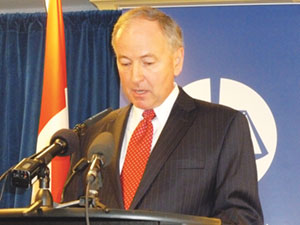HALIFAX — Federal Justice Minister Rob Nicholson brushed off a barrage of criticism for his tough-on-crime policies during his annual appearance at the Canadian Bar Association’s conference in Halifax last week.

Earlier, the CBA’s council passed a string of resolutions sponsored by its criminal justice section calling for the federal government to tone down legislation expanding mandatory minimum sentences for certain offences by inserting a so-called safety valve in Criminal Code amendments.
It also asked Nicholson to reconsider the policies in the light of their costs through increased imprisonment and their effects on the aboriginal community and mentally ill offenders.
But Nicholson stood firm under questioning from lawyers and reporters, insisting that lawmakers are entitled to give guidance to the court and that voters had endorsed his approach during the federal election in May.
“That is our job. We set the guidelines where we believe they are appropriate. There are a number of mandatory minimums already existing in the criminal justice system. I would suggest the ones we have introduced are reasonable and appropriate under the circumstances.
I think that’s part of our mandate that we are given as legislators. We set maximum sentences, and in some cases where we believe it’s appropriate, we set minimum sentences.”
Manitoba lawyer Josh Weinstein attempted to extract a compromise from Nicholson through one motion at council that called for a safety valve allowing judges to consider other sentencing options “where injustice could result by the imposition of a mandatory minimum sentence.”
According to Weinstein, the safety valve could kick in when offenders have mental illnesses or other conditions, including fetal alcohol spectrum disorders. He said legislatures in Britain, Australia, and South Africa have all implemented similar provisions alongside mandatory minimum legislation.
“Judicial discretion allows judges to take into account a number of factors in relation to sentencing an offender, taking into account both the offender and the offence. With the imposition of mandatory minimums, that is eroded and in some cases absolutely gone.
It’s hopefully a starting point of an approach that we could take with the government to deal with injustices that are occurring with respect to sentencing.”
Montreal litigator Simon Potter said he worries the government is showing a lack of trust in judges to do their job, something he calls a “very dangerous path” to tread.
“To throw in what is merely a safety valve to allow a justice as a last resort and as a matter of simple justice in a particular case to go back to judging is a minimal step we can take to preserve some balance,” he said.
But Nicholson shot the idea down at the conference, claiming judicial discretion remained intact. “I think we’re giving that discretion to the courts. We set the maximum, which is our obligation to do, and in some cases we set a minimum, and within that framework, the judiciary can decide what’s appropriate,” he said.
Supporting a separate resolution, Brad Regehr, chairman of the CBA’s national aboriginal law section, said he feared an increase in the number of mandatory minimum sentences would exacerbate the overrepresentation of First Nations peoples in Canada’s jails.
In Manitoba, where he works, 75 per cent of inmates are aboriginal despite making up just 15 per cent of the population.
“Mandatory minimum sentences are doing absolutely nothing to resolve this ongoing crisis,” Regehr said, adding that the government’s policies may be at odds with the Supreme Court’s decision in R. v. Gladue.
It requires judges to give special consideration to the unique circumstances and challenges facing aboriginal people in the justice system.
“My fear and the likelihood is that these changes will impact aboriginal people the hardest and most disproportionately and simply add to a problem which stains Canada’s international reputation.”
But Nicholson said it would be hard to predict the effect of the legislation on rates of aboriginal incarceration ahead of time. “Mandatory minimums apply to everyone,” he said.
In addition, Nicholson touted the success of his department’s aboriginal justice strategy. “It does reduce the recidivism rate when people get involved with the strategy,” he said. “I wouldn’t support the aboriginal justice strategy if I didn’t think it was making a positive difference.”
Another avenue of CBA attack came from the projected cost of tougher sentences.
Backing a resolution that called on the federal government to reveal the cost of its crime bills, Saskatchewan prosecutor Loreley Berra told the CBA council she had “no doubt that the public supports the stance of tough on crime” but called it “uninformed support and uninformed consent on the issue.”
She pointed to a report by the parliamentary budget officer estimating the cost of Nicholson’s truth-in-sentencing bill at around $5 billion over five years. That’s roughly twice the official government estimate.
“Where are these funds coming from? Is it coming from health care, the environment or other resources?” Berra asked.
Nicholson reiterated the government estimates and said some other measures, including his megatrials bill to streamline large-scale prosecutions, would actually save money.
“Canadians are very clear that they are prepared to pay the cost of keeping individuals that shouldn’t be on the street off the street,” he said.
For more on the CBA conference, see
"Bar drops ball in national class actions."

 Earlier, the CBA’s council passed a string of resolutions sponsored by its criminal justice section calling for the federal government to tone down legislation expanding mandatory minimum sentences for certain offences by inserting a so-called safety valve in Criminal Code amendments.
Earlier, the CBA’s council passed a string of resolutions sponsored by its criminal justice section calling for the federal government to tone down legislation expanding mandatory minimum sentences for certain offences by inserting a so-called safety valve in Criminal Code amendments.